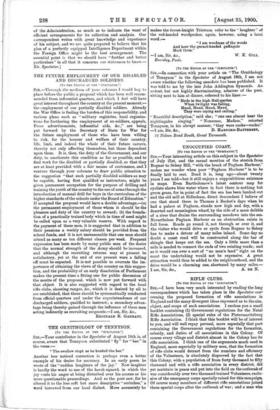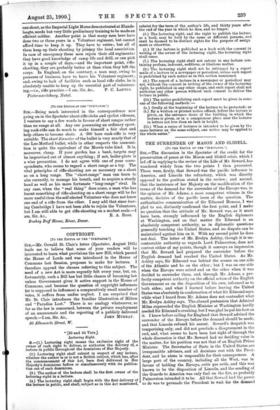RIFLE CLUBS.
[TO THE EDITOR OF THE "SPECTATOR."] SIR,—I have been very much interested by reading the long correspondence which has taken place in the Spectator con- cerning the proposed formation of rifle associations in England and the many divergent ideas expressed as to the aim, object, and scope of such associations. I enclose you a small booklet containing (1) Government regulations for the Natal Rifle Associations, (2) special rules of the Pietermaritzburg Rifle Association. I think that this booklet will be of interest to you, and will well repay perusal, more especially that part containing the Government regulations for the formation, subsidy, and duties of all associations in this Colony. Of course every village and district almost in the Colony has its rifle association. I think one of the arguments much used in England, more especially by military men, that the formation of rifle clubs would detract from the numbers and efficiency of the Volunteers, is absolutely disproved by the fact that this Colony, with a population of from forty thousand to fifty thousand and with a rifle association in every district, did yet maintain in peace and put into the field on the outbreak of war considerably over two thousand trained Volunteers, exclu- sive of the emergency corps specially raised for this campaign. Of course many members of different rifle associations joined these special corps after the outbreak of war; and a man who
can shoot, as the Imperial Light Horse demonstrated at Elands- laagte, needs but very little preliminary training to be made an efficient soldier. Another point is that many men here have done two or three years in a Volunteer regiment, but cannot afford time to keep it up. They have to retire ; but all of them keep up their shooting by joining the local association. In case of emergency these men rejoin their old regiments; they have good knowledge of camp life and drill, or can pick it up in a couple of days,—and the important point, rifle- shooting, they are probably better at than when they left the corps. In England, on the contrary, a man may, owing to pressure of business, have to leave his Volunteer regiment ; and, owing to lack of facilities such as local rifle clubs, he is absolutely unable to keep up the essential part of volunteer- ing,—i.e., rifle practice.—I am, Sir, &c., P. C. LOFTUS. Pietermaritzburg, Natal.



































 Previous page
Previous page